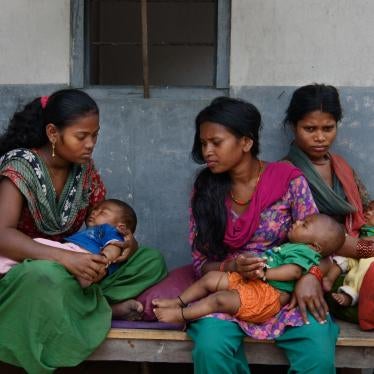Dear Hinoshita Eiji:
We are writing in advance of Japan’s s participation in the Family Planning 2020 Summit (FP2020) in London on July 11, 2017.
Japan played an important leadership role in its significant commitment to sexual and reproductive health and rights at the 2012 Family Planning Summit, where Japan reiterated its 2010 commitment of US$5 billion to family planning over 5 years, including an explicit commitment to the United Nations Population Fund (UNFPA) and International Planned Parenthood Federation (IPPF).
Investments in family planning are lifesaving. Every day, over 800 women and girls around the world die from preventable causes related to pregnancy or childbirth. Complications from pregnancy and childbirth are the second leading cause of death for adolescents ages 15 to 19 globally. And the World Health Organization estimates that at least 22,000 women die from abortion-related complications each year.
Of the estimated 225 million women with unmet need for family planning, a significant proportion are actively displaced because of armed conflict or natural disaster. Humanitarian interventions have often overlooked access to sexual and reproductive health services.
For example, a May 2017 Human Rights Watch report, “No Control, No Choice: Lack of Access to Reproductive Healthcare in Sudan’s Rebel-Held Southern Kordofan,” documents how women and girls cannot get contraception and have little access to health care if they face complications during pregnancy and childbirth. The little data that exists suggests that maternal mortality is significantly higher in these conflict-affected areas in comparison to other parts of Sudan which have seen a marked decline in maternal deaths.
The health risks associated with pregnancy and childbirth are heightened in humanitarian settings, and providing sexual and reproductive health services is empowering and saves lives. Despite the challenging context, a growing body of evidence shows that provision of family planning in crisis settings is both feasible and cost-effective and is a key element for meeting national family planning and development goals.
As Human Rights Watch colleagues discussed with you in May, Japan’s public leadership on sexual and reproductive health and rights is more important than ever. The Family Planning Summit on July 11 provides an opportunity for Japan to assert its leadership on women’s sexual and reproductive health and help meet the FP2020 goal of providing 120 million women with family planning. Human Rights Watch urges Japan to provide:
- Financial and political support, including through public statements, for comprehensive sexual and reproductive health services, including access to safe and legal abortion; and
- Political support, including through public statements, for expanded attention and focus to sexual and reproductive health services in humanitarian settings, and to designate committed funds accordingly.
As a follow-up to our February 24 letter on the US government’s dramatically expanded Mexico City Policy, or “Global Gag Rule,” we would also like to urge Japan to:
- Conduct an assessment of the impact of how these restrictions and resulting cuts to Japan’s partner organizations or priority partner countries may affect Japan’s longstanding investments into global health, including family planning, HIV/AIDS, malaria, TB, and maternal and child health.
- Provide information to the US government on any consequences of the Mexico City Policy on Japan’s foreign assistance investments.
- Support partners affected by the policy, including by ensuring they understand what is permitted or not as there is general confusion and lack of clarity that could undermine health programs and advocacy. We have attached an English and Japanese version of an explanatory question and answer document if this is useful.
We are deeply grateful for your attention and we would be happy to discuss these issues further.
Kanae Doi
Japan Director
Human Rights Watch
Nisha Varia
Women's Rights Advocacy Director
Human Rights Watch







